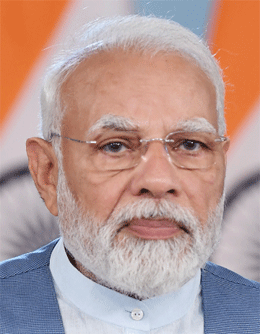Prime Minister, Narendra Modi, addressed a Post Budget Webinar on the subject of ‘Ease of Living using Technology’. It is the fifth of a series of 12 post-budget webinars organized by the government to seek ideas and suggestions for the effective implementation of the initiatives announced in the Union Budget 2023.
Addressing the gathering, the Prime Minister said that India of the 21st century is constantly empowering its citizens with the use of technology. He underlined that every budget in the past few years has stressed the ease of living for people with the help of technology. In this year’s budget, the Prime Minister emphasised, the priority is given to technology and a human touch.
Highlighting the contradictions in the priorities of the previous governments, the Prime Minister recalled how a particular section of people always looked for government intervention and expected it to do good for the people. However, the Prime Minister said that their entire life was spent in the absence of these facilities. He also highlighted another section of people that wanted to move ahead but were dragged down by pressure and obstacles created by government intervention. The Prime Minister noted the changes that have taken place and said that the policies and their positive effects have been observed in situations where it is most necessary while making lives simpler and enhancing the ease of living. He also noted that government intervention has been reduced and citizens do not consider the government to be an obstacle. Instead, the Prime Minister said that citizens are looking at the government as a catalyst where technology plays a huge role.
The Prime Minister elaborated upon the role of technology in this by giving examples of One Nation One Ration Card and JAM (Jan Dhan-Aadhar-Mobile) trinity, Arogya Setu and CoWin App, railway reservation and Common Service Centers. With these decisions, the Prime Minister said that the government has enhanced the ease of living of the citizens.
The Prime Minister also highlighted the popular feeling about ease of communication with the government as the dialogue has become easy and people are getting quick resolutions. He gave examples of the faceless resolution of Income tax system-related grievances. “Now between your grievances and the redressal there is no person, just technology”, he said. The Prime Minister asked various departments to collectively think about using technology for solving their problems and reaching global standards. “Going a step further, we can identify the areas where dialogue with the government can be further eased”, he added.
The Prime Minister touched upon Mission Karmyogi and informed that the government employees are being trained with a view to becoming more citizen-centric. He also emphasised the need to keep updating the training process and highlighted that with modifications based on the feedback from the citizens, significant improvement can be witnessed. The Prime Minister suggested creating a system where feedback can be easily submitted to improve the training.
The Prime Minister highlighted the equal opportunities that technology is providing to everyone and said that the government is investing heavily in technology. Along with creating modern digital infrastructure, the government is ensuring that the benefits of digital infrastructure reach everyone equally. He illustrated this by talking about the GeM portal that is giving a presence to small businessmen and even street vendors in government procurement. Similarly, e-NAM is allowing farmers to get linked with buyers at different places.
Referring to 5G and AI and their impact on industry, medicine, education and agriculture the Prime Minister emphasized the need to set a few targets. He asked about the ways through which these technologies can be deployed for the welfare of the common citizens, and the sectors to be focussed. “Can we identify 10 such problems of the society which can be solved by AI”, he said.
Giving examples of the use of technology in the government, the Prime Minister touched upon the Digilocker services for entities where companies and organizations can store their documents and also share them with government agencies. He suggested exploring ways to expand these services so that more people can benefit from them.
In the last few years, the Prime Minister informed that several significant steps have been taken to support MSMEs and stressed the need to brainstorm and identify the obstacles faced by MSMEs. Highlighting that time is money in business terms, the Prime Minister pointed out the government’s efforts to reduce the compliance cost for small enterprises thereby reducing time. He suggested that this is the correct time to make a list of unnecessary compliances as the government has put an end to more than forty thousand appliances in the past.
“The lack of trust between the government and the people is the result of a mindset of slavery”, the Prime Minister remarked as he pointed out that the government has won back the trust of the citizens by decriminalizing petty offences and becoming a loan guarantor for MSMEs. He also stressed gaining experience from best practices around the world about the work carried out in other countries to build trust between the government and citizens.
Highlighting the role of technology, the Prime Minister pointed out that technology can help in creating a finished product that can help in capturing the global market. He suggested that one should not limit themselves to only the internet and digital technology. Concluding the address, the Prime Minister stressed that the success of the budget or any government policy depends on how well it is prepared but also highlighted the importance of people’s cooperation. He referred to India’s talented youth, skilled manpower and willingness to adopt technology in the villages and suggested finding ways to make the most out of it. “You must discuss how to make the most out of the budget”, the Prime Minister concluded.


